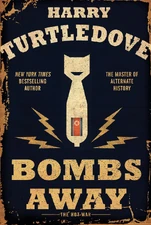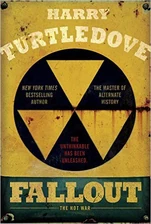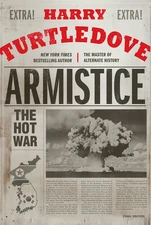TR (Message Wall | contribs) No edit summary Tag: rte-source |
TR (Message Wall | contribs) No edit summary Tag: rte-wysiwyg |
||
| (2 intermediate revisions by the same user not shown) | |||
| Line 7: | Line 7: | ||
|occupation = Soldier}}'''Matt Harrison''' (born c. 1895) was a brigadier general in the [[United States Air Force (The Hot War)|United States Air Force]]. He commanded a base near [[Pusan (The Hot War)|Pusan]], [[South Korea (The Hot War)|South Korea]] before and after the [[Korean War (The Hot War)|Korean War]] became part of [[World War III (The Hot War)|World War III]].<ref>''[[Bombs Away]]'', pgs. 24-25, ebook.</ref> |
|occupation = Soldier}}'''Matt Harrison''' (born c. 1895) was a brigadier general in the [[United States Air Force (The Hot War)|United States Air Force]]. He commanded a base near [[Pusan (The Hot War)|Pusan]], [[South Korea (The Hot War)|South Korea]] before and after the [[Korean War (The Hot War)|Korean War]] became part of [[World War III (The Hot War)|World War III]].<ref>''[[Bombs Away]]'', pgs. 24-25, ebook.</ref> |
||
| − | In January, 1951, he informed the base that [[President of the United States#Other Presidents|President]] [[Harry Truman (The Hot War)|Harry Truman]] |
+ | In January, 1951, he informed the base that [[President of the United States#Other Presidents|President]] [[Harry Truman (The Hot War)|Harry Truman]] had authorized the use of [[Atomic bomb (The Hot War)|atomic bombs]] against [[China (The Hot War)|China]], and that all of the atomic bombs at the base now had pits in them. He gave the pilots under his command a chance to withdraw if they had qualms of conscience, and promised that their would be no black marks on their record (which was almost certainly an empty promise). He scowled when several flyers left.<ref>Ibid.</ref> |
| + | |||
| + | A few weeks later, Harrison informed the base that Truman had transferred the final decision making to MacArthur, authorizing the general to use them if, in MacArthur's view, their use was the only way to improve the situation. The situation had certainly worsened, as the Chinese had relentlessly marched south throughout December and into January, recapturing [[Seoul (The Hot War)|Seoul]], the South Korean capital.<ref>Ibid., pg. 38.</ref> Harrison also informed the base that aerial reconnaissance showed that the [[Soviet Union (The Hot War)|Soviets]] were moving fighters and bombers onto airstrips in southeastern [[Siberia#Siberia in The Hot War|Siberia]]. One pilot, [[Bill Staley]], asked about the possibility that the Soviets might paint their [[Tu-4 (The Hot War)|Tu-4's]] to look like [[B-29 (The Hot War)|B-29s]], the model the Soviet bombers were copies of. Harrison hoped that U.S. forces would be alert, but admitted they may not always be.<ref>Ibid., pgs. 40-41.</ref> |
||
{{Under construction}} |
{{Under construction}} |
||
Revision as of 16:28, 13 October 2015
| Matt Harrison | |
| Fictional Character | |
| The Hot War POD: November, 1950 | |
| Appearance(s): | Bombs Away |
| Type of Appearance: | Direct |
| Nationality: | United States |
| Date of Birth: | c. 1895 |
| Occupation: | Soldier |
Matt Harrison (born c. 1895) was a brigadier general in the United States Air Force. He commanded a base near Pusan, South Korea before and after the Korean War became part of World War III.[1]
In January, 1951, he informed the base that President Harry Truman had authorized the use of atomic bombs against China, and that all of the atomic bombs at the base now had pits in them. He gave the pilots under his command a chance to withdraw if they had qualms of conscience, and promised that their would be no black marks on their record (which was almost certainly an empty promise). He scowled when several flyers left.[2]
A few weeks later, Harrison informed the base that Truman had transferred the final decision making to MacArthur, authorizing the general to use them if, in MacArthur's view, their use was the only way to improve the situation. The situation had certainly worsened, as the Chinese had relentlessly marched south throughout December and into January, recapturing Seoul, the South Korean capital.[3] Harrison also informed the base that aerial reconnaissance showed that the Soviets were moving fighters and bombers onto airstrips in southeastern Siberia. One pilot, Bill Staley, asked about the possibility that the Soviets might paint their Tu-4's to look like B-29s, the model the Soviet bombers were copies of. Harrison hoped that U.S. forces would be alert, but admitted they may not always be.[4]
| This article or section is in the middle of an expansion or major restructuring. You are welcome to assist in its construction by editing it as well. |
References
- ↑ Bombs Away, pgs. 24-25, ebook.
- ↑ Ibid.
- ↑ Ibid., pg. 38.
- ↑ Ibid., pgs. 40-41.
| |||||||||||||||||||||


